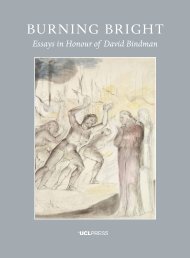Archives
TiL0x
TiL0x
You also want an ePaper? Increase the reach of your titles
YUMPU automatically turns print PDFs into web optimized ePapers that Google loves.
of which Huizinga appeared resolutely pessimistic about the state of<br />
contempor ary civilisation, disinclined to engage with current political<br />
reality, and nostalgically yearning for better times in the past.<br />
As a result, the succinct and sharply focused account of the<br />
strength of Homo Ludens that stands at the heart of Colie’s article tends<br />
to get overlooked. Colie had written:<br />
Homo Ludens . . . was just what it said it was, a study of the play<br />
element in culture. ‘Culture’ was Oriental, ancient, medieval, and<br />
modern history; the ‘play element’, the games of philosophy, war,<br />
law, literature, the arts, as well as play in childhood and in adult<br />
life. Out of the phenomena Huizinga constructed a theory, not of<br />
games, but of something much more fundamental: a theory of the<br />
functions of play, always seen against the ostensibly more serious<br />
‘normal’ modes of life. . . . Homo Ludens is the history neither of<br />
playing nor the idea of play. It is a morphological study of play,<br />
an interpretation of human behavior based upon comparative<br />
examples. 11<br />
The plea at the end of her article for continued attention to Huizinga’s<br />
work (‘this monument lying athwart the path of [Dutch historians’]<br />
profession’ as she describes it earlier) is similarly affirmative:<br />
Huizinga indeed left no school, but he left the testament of his<br />
talents. It is up to cultural historians to dispose of his legacy. We<br />
may choose to bury our one talent in the ground (which heaven<br />
knows, is the easiest thing to do with it), but if we do that, we will<br />
find our talent taken from us at the judgment and given to [some]<br />
other servant of history who has dared trade with his five talents<br />
and come to the judgment with ten [Matthew 25:14–30]. 12<br />
I understand this to mean that Colie believes that it will be thoroughly<br />
worthwhile for her generation to invest scholarly effort in developing<br />
Huizinga’s original idea of play to their own intellectual ends, thereby<br />
turning his original investment into a handsome reward for those who<br />
come after him. 13<br />
12 Colie, ‘Huizinga and the task of cultural history’, p. 630.<br />
11 Colie, ‘Huizinga and the task of cultural history’, p. 614.<br />
13 Ernst Gombrich too, in his 1972 conference paper on Huizinga dedicated to Colie’s memory,<br />
attempts a contextualised view of the significance of Homo Ludens. Once again, Gombrich<br />
acknowledged the influence of that work on his own (he cites his Meditations on a Hobby<br />
Horse as directly indebted), but he too ends up lamenting Huizinga’s failure properly to<br />
The Afterlife of Homo Ludens 89





